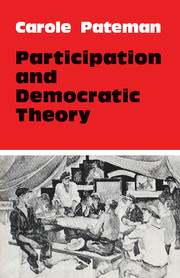Book contents
- Frontmatter
- Contents
- I Recent theories of democracy and the ‘classical myth’
- II Rousseau, John Stuart Mill and G. D. H. Cole: a participatory theory of democracy
- III The sense of political efficacy and participation in the workplace
- IV ‘Participation’ and ‘democracy’ in industry
- V Workers' self-management in Yugoslavia
- VI Conclusions
- Bibliography
- Index
III - The sense of political efficacy and participation in the workplace
Published online by Cambridge University Press: 05 August 2014
- Frontmatter
- Contents
- I Recent theories of democracy and the ‘classical myth’
- II Rousseau, John Stuart Mill and G. D. H. Cole: a participatory theory of democracy
- III The sense of political efficacy and participation in the workplace
- IV ‘Participation’ and ‘democracy’ in industry
- V Workers' self-management in Yugoslavia
- VI Conclusions
- Bibliography
- Index
Summary
The contemporary and participatory theories of democracy both include the argument that individuals should receive some ‘training’ in democracy outside the national political process. However, advocates of the contemporary theory such as Dahl or Eckstein give little indication of how this training takes place, and there is something paradoxical in calling socialisation inside existing organisations and associations, most of which, especially industrial ones, are oligarchical and hierarchical, a training explicitly in democracy. The argument in the participatory theory of democracy that the education for democracy that takes place through the participatory process in non-governmental authority structures requires, therefore, that the structures should be democratised, looks, on the face of it, rather more plausible (although Sartori has claimed that it has been disproved that one ‘learns to vote by voting’). Before looking to see if there is any empirical evidence to support the suggested connection between participation in the workplace and participation in the wider political sphere, there is a prior question about how this connection might take place. Again, there is common ground here between the two theories as both point to psychological factors as playing the mediating role. The theory of participatory democracy argues that the experience of participation in some way leaves the individual better psychologically equipped to undertake further participation in the future and some interesting evidence in support of this argument can be found in recent empirical studies of political socialisation and political participation.
- Type
- Chapter
- Information
- Participation and Democratic Theory , pp. 45 - 66Publisher: Cambridge University PressPrint publication year: 1970
- 2
- Cited by



